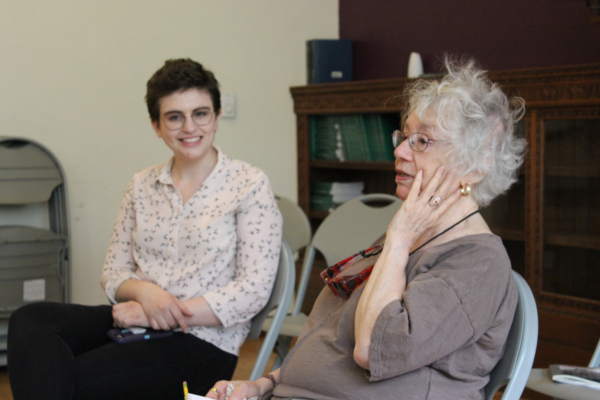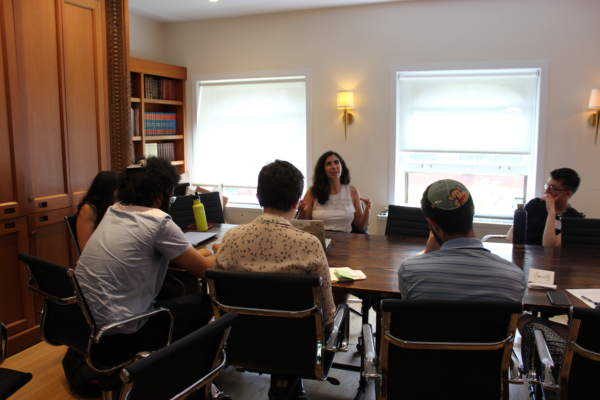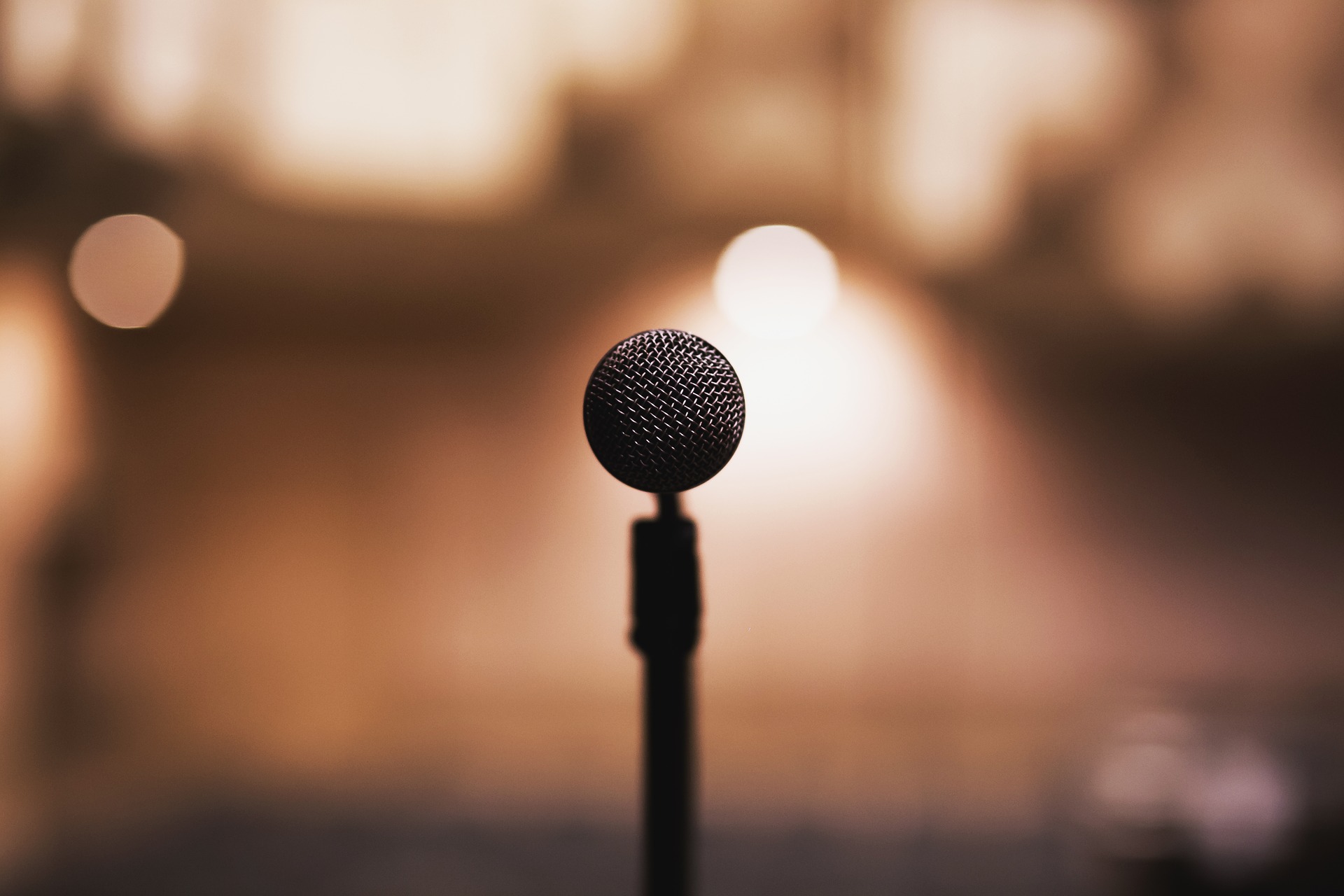It can be hard to figure out what your voice is, let alone how to reclaim it.
It’s even harder to envision right after you’ve experienced the particularly ugly face of antisemitism.
Sunday morning, bright and early, I got off the subway on my way to the New Voices Jewish Student Journalism Conference. My headphones were in as I hurried south, worried I would be late. As I crossed a street, a woman’s eyes locked onto my head, clad in a large purple kippah. I braced myself, and sure enough, she began to curse me, her fuck you’s attacking not only myself but an entire people.
It felt regular, non-monumental. I was upset by it, but I saw no use in saying anything to confront the antisemitism I’d grown so used to. My voice stuck in my throat. I’d been stripped of the right to tell my own narrative.
And that’s why walking into the Jewish Student Journalism Conference felt so special to me. The space looked un-intimidating – folding chairs crowded a room, platters of bagels and schmear lay on tables. I didn’t know it yet, but around that room stood the future of American Jewish journalism, and the key to my voice.
Two and a half years ago, I read a piece that changed my life. NPR’s Leah Donnella penned a deeply personal essay about being both Jewish and Black, and the complicated identity she held. I felt like she was speaking directly to my own experiences. More than that, her piece made me realize what should have been obvious – that plenty of Black Jews existed, and that we existed in some pretty prominent places.
Donnella was one of the first speakers at the conference. Called “Truth Telling in the Newsroom,” her session began as we gathered in a large circle of chairs on Sunday morning. Donnella shared stories of being pushed to be the “Black voice” or the “Jewish voice” in different journalistic spaces. She spoke powerfully about the line between being tokenized and reclaiming her own identity.
Later in the day, a panel called “The Future of Jewish Media” brought together Ben Ratskoff, the editor in chief of PROTOCOLS, Arielle Angel, an editor at Jewish Currents, and Jacob Plitman, Jewish Currents’ publisher. The group discussed objectivity, often lauded as the best friend of the journalist and defined as a complete removal of the self from published work. Angel spoke about the history of Jewish media, pointing out that most magazines and newspapers have political or ideological orientations, and that objectivity is a relatively new pursuit.
“Within some spaces, especially a lot of mainstream news outlets, there is an assertion that one can view facts, figures, political situations, social relations, in some way that is somehow completely disembodied. As if you’re a brain floating around and observing…The idea that anyone can do that is sort of transparently ridiculous,” added Plitman. He went on to credit feminist theory for the concept of bringing one’s body and experiences to every situation.
Sunday ended with a conversation between Columbia Journalism Professor Samuel Freedman and Amy Goodman of Democracy Now!. In addition to talking about her path into journalism, Goodman focused on her experience reporting from Standing Rock Reservation. She described the warrants for her arrest in North Dakota, as a result of her coverage of the protests against the Dakota Access Pipeline.
Goodman and her team began their broadcast across from the local courthouse, amid outpourings of solidarity so extensive that riot police were brought in. Goodman’s pending arrest became front-page news around the country. Because of the enormous media coverage, Goodman’s charges were dropped, as well as those of most of the Native Americans facing charges that day. “This is what happens when you’re there on the ground, showing people’s realities,” said Goodman. “It’s our job as journalists to go where the silence is.”
On Monday, Dorothy Zellner, a veteran of the 1960s civil rights movement and current Palestinian solidarity activist, took a different angle on the question of neutrality and objectivity in reporting. Zellner served as co-editor of the Student Nonviolent Coordinating Committee’s (SNCC) newsletter, the Student Voice, working alongside leader Julian Bond.

During Zellner’s work with SNCC, activist Fannie Lou Hamer was brutally beaten by police officers during her participation in a voter registration drive. It was the job of Zellner and the rest of the Student Voice to document this violence.
“She was our hero. We didn’t say she was a hero. We said Mrs. Hamer tried to register to vote and was almost beaten to death by the cops in the police station. And that’s what I mean by neutrality…we just said the facts,” said Zellner. The facts spoke for themselves, but the journalists had to place themselves in a position to report them.
Rebecca Pierce, a Black Jewish filmmaker, journalist, and activist, also described her work to bring her full self to her work and reclaim her narrative. She spoke about one of her newest projects, Unruly, a publication run by the Jews of Color and Sephardi/Mizrahi (JOCSM) Caucus of Jewish Voice for Peace.
“We’re working together to create a publication by and for Jews of Color, but not only about our issues, but about all the different intersections we’re working with – Palestine solidarity, race in the U.S., antisemitism, Zionism,” said Pierce.
She added that she is able to use her Black experience as a lens to understanding the Palestinian experience, demonstrating that her identity as a marginalized person gives her motivation to expose, document, and fight marginalization in all its forms.
Eli Valley’s discussion of his cartoons, along with his diasporic ethos, tied the conference together perfectly.
“We are at the tail end of a culture war that has defined Jewish authenticity for a century. Because when Zionists emerged on the scene over 100 years ago, they weren’t just trying to create a state. They were trying to refashion the very image and essence of the Jew,” he said.
Valley presented the diaspora Jew as the necessary and omnipresent foil to Zionism, calling things like the portrayal of diaspora Jewry in an Israeli museum “government-sponsored self-hatred created to sustain a national mythology.” Valley’s work exists to fight this erasure of diasporic Jewish culture, and to powerfully exert the many identities that he and other American Jews hold.

Hearing brilliant speakers chronicling their experiences in journalism and advising us to take control of our own narratives had an impact on me. Perhaps more significant was watching as my fellow students stepped into their own power. Students led workshops on radio and podcasts, zine-making, and investigative reporting, and several students moderated panels of professional journalists. Ariella Markowitz, a senior at Williams College who led a session on podcasting, described the conference as “an empowering reminder of the influence we’ll have in shaping public media, and the history of Jewish leftism in media.”
Sophie Hurwitz, the 2019 New Voices fellow at the Jewish Women’s Archive and a rising junior at Wellesley College, also viewed the conference as a reminder of the power we have to reclaim our narratives. “This conference was full of young people who want to make grand changes in the way the often-static and insular Jewish media world functions…It gave me hope that we might be working towards a Jewish media that actually reflects the way our community is evolving.”
Circling the conference space at the end of the day, I heard students eagerly discussing plans to collaborate with each other or loop each other in to projects and publications. Zines lay on tables and in hands, fresh from that morning’s zine workshop. I felt a sense of optimism float around the room. While it is obviously a long, arduous journey, I’d just spent two days with some of the most powerful journalists I’ve ever met, and I knew that together, we would change the world of Jewish journalism.
Bentley Addison is a junior majoring in sociology and political science and minoring in Jewish studies at Johns Hopkins University. His work has appeared in Haaretz, the Jewish Daily Forward, and the Johns Hopkins News-Letter.
Featured image credit: Pixabay.com/freestocks-photos.

